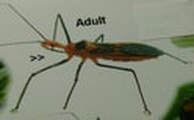 Our gardens are full of beauty. We take great pride in the colorful flowers and lush veggies we so carefully nourish. When we see “critters” chowing down on the fruit of our labor sometimes the first instinct is to run for a chemical that will kill them and do it fast. The problem is that many of the insects and other creatures are an important part of maintaining a balance in our garden. Even though they are sometimes scary looking they can be our partners in pest control. Integrated pest management (IPM) is a cost effective strategy to avoid, prevent, and manage pest damage with minimum harm to human health, the environment, and nontarget organisms. IPM is the pest management strategy implemented by the Texas AgriLife Extension Service. Insecticides should be used only as a last resort as they are harmful to the environment and to us. They don’t discriminate between beautiful butterflies and ugly Leaf-footed bug pests. A strong spray of water from the hose will knock off Aphids and they will not be able to return to the plant. Those nasty Hornworms devouring your precious tomatoes can best be eliminated by putting on your garden gloves and picking them off by hand. Learning how to recognize the beneficials as allies will make your pest control job easier. SOME BENEFICIAL INSECTS HUNTERS These hard working predators include Lacewings, Assassin bugs, Lady beetles (yes Ladybugs are actually beetles), Praying Mantids, Dragonflies, Damselflies, and Spiders. These are just a few of the helpers that control the insect population. The adult Assassin Bug is often found doing his job devouring a broad range of prey including Aphids. He is considered a beneficial in spite of his ominous name. Caution, do not attempt to handle him. He will bite. Assassin Bug picture from Garden Insect Field Guide, Fort Bend County Entomology Group, Master Gardeners POLLINATORS Pollinators include Butterflies, Honeybees, Hoverflies, Wasps and many others. According to the U.S Department of Agriculture, pollinators are responsible for 80% of the worlds flowering plants. Without them humans and wildlife wouldn’t have much to eat or look at. It is estimated pollinators are worth at least 20 billion dollars annually just in the United States. Many species are threatened and crop production is decreasing because of a shortage of pollinators. DECOMPOSERS Decomposers are possibly the most underappreciated of all the beneficials. They live off of the nutrients held in dead organisms. Without the work they do we would be overwhelmed with dead bodies and organic wastes. They include the humble Earthworm as well as Slugs, Snails, Bark Lice, Ox or Elephant beetle to name just a few. Earthworms aerate the soil and enrich it in the form of castings. The castings are a desirable natural fertilizer. People spend money on Earthworm castings but wouldn’t it be much better to welcome them to your garden by maintaining a healthy soil? Given the right environment, in 90 days the total number of earthworms in an area can double. Take a little time in your garden every day, be observant of the activities and the interaction taking place there. Gardening connects us to nature and helps us better understand how nature works. - Kathy Gilmore For questions about IPM (integrated pest management) Master Gardener Volunteers are available to help you find answers to all your basic questions. Email: [email protected] Phone 281-341-7068 Fax 281-633-7070 Texas A&M AgriLife Extension service offers the knowledge and resources of both Texas A&M and Prairie View A&M Universities to educate Texans for self-improvement, individual action and community problem solving. We are a part of a statewide educational network and a member of the Texas A&M University system which values and promotes citizen and community involvement, scientifically-based education, lifelong learning, and volunteerism. Extension is linked in a unique partnership with Fort Bend County Commissioners’ court and the nationwide Cooperative Extension System. |
Proudly powered by Weebly
